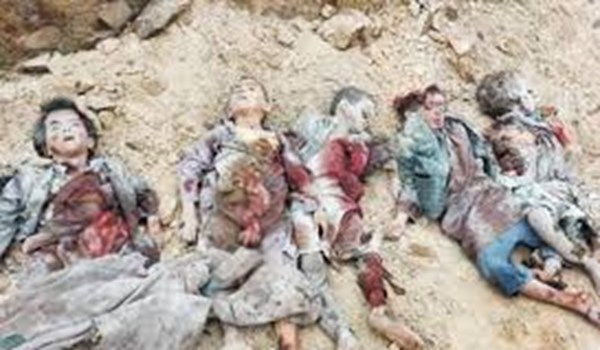Nearly 15 Million Yemenis Suffering No Access to Basic Healthcare

Ms. Hodeib, in an exclusive interview, said that according to UNOHCHR,
16,200 Yemeni civilians have been killed since the start of the Saudi aggression
against Yemen in March 2015.
The Communication Coordinator for the International Committee of the Red Cross
(ICRC) in Yemen also said the International Humanitarian Law (IHL) has been
repetitively violated in Yemen in the past couple of years, and she called for
consideration of the situation of the population.
A former journalist, Mirella Hodeib has been serving as the Director of
Communications for the ICRC in Yemen since February 2018.
FNA has conducted an interview with Mirella Hodeib about the deteriorating
humanitarian situation in Yemen which is the direct result of the Saudi-led war
on its Southern neighbor, and is getting worsened by the Saudi-Emirati food
blockade against the war-torn country.
Q: How many Yemeni civilians have been killed in the war?
A: UN agencies have more oversight when it comes to casualties. According to
UNOHCHR, for example, the Yemen conflict left 16,200 civilian casualties since
March 2015.
Q: How many times the Saudi-led coalition has attacked hospitals and medical
centers in Yemen? Please elaborate on damages and tolls.
A: Over the past years, violations of International Humanitarian Law (IHL) have
been happening across the board in Yemen. All parties to this conflict, and
States supporting them, need to more effectively consider the situation of the
population during the planning and execution of military action in order to
better respect and protect civilians. All parties must guarantee that all
measures are taken to protect civilians and civilian infrastructure. That’s why
the International Committee of the Red Cross has called on all parties to the
conflict to ensure the safety of the civilian population and civilian objects,
including medical facilities and medical staff. Under IHL, the civilian
population, medical personnel, ambulances, medical facilities schools, prisons
but also water and electricity plants must be respected and protected in all
circumstances, and the work of medical personnel must be facilitated.
Q: How many wounded people or patients need help and why they cannot leave Yemen
for treatment?
A: Difficulty of movement in and out of the country but also within the country
has had a direct impact on access to healthcare to the population. The impact of
the conflict on medical facilities and essential infrastructure is worsening the
humanitarian consequences for Yemenis. Only 45% of health facilities are
functioning and 14.8 million people lack access to basic healthcare. Reports of
cases of all kinds of preventable diseases re-emerging including cholera,
meningitis, measles and diphtheria are yet another reminder of the incapacity of
Yemen’s health system to cope with ever increasing needs.
Q: Does Saudi Arabia - as the leader of the Arab coalition and starter of war -
respect the humanitarian aspects in the war? Does it cooperate with the
international human rights and medical organizations?
A: Throughout the conflict, we have seen worrying trends undertaken by all
parties to the conflict across Yemen. The ICRC holds a confidential dialogue
with all parties to the conflict to work with them for a better understanding
and abidance by IHL, and so far all those concerned have been open and
collaborative.
Q: Why do you call Yemen crisis as the biggest humanitarian crisis in recent
years? What is its difference with other crises?
A: Civilians have paid the heaviest price for the conflict. Yemenis face war,
hunger and diseases. Indebted and vulnerable, millions across Yemen survive on
one meal per day. Every day many Yemeni families must choose between food and
medicine. The humanitarian situation in Yemen is catastrophic. Almost every
aspect of daily life has been affected by the conflict – fuel and food prices,
access to clean water and the ability to move around. More than 75 percent of
the population is in need of aid.
Q: How is the situation of people's food reserves and nutrition? What do they
eat?
A: Difficulties of imports to get into the country and move around within the
country but also the drastic increase of prices – more than 30 percent over the
past couple of months - for basic commodities such as rice, lentils, cooking
oil, milk and sugar puts food security on shaky grounds. Yemeni families have
lost sources of income and exhausted meager savings many survive on one meal per
day. In settlements, some families find nothing to eat; they survive on small
portions of rice or flour.
Q: Do you, as a Red Cross official, have instruments to improve conditions in
Yemen? Have you raised the crisis in Yemen with the international bodies or are
you trying to do so?
A: ICRC’s assistance has been provided in the first place, to the most
vulnerable groups of the population – conflict-affected residents and displaced
people, and detainees, mine victims - and to medical facilities as well as water
corporations. This year in Yemen, ICRC-supported primary healthcare centers
treated more than 207’000 patients, while ICRC-supported hospitals treated
14,000 war wounded. Internally displaced, host communities and returnees
benefited from ICRC and Yemen Red Crescent support for helping cover their daily
needs. More than 500’000 people (71’428) households met some of their dietary
needs with food parcels – which included nutritional supplements for
malnourished children and pregnant or lactating women. In addition, more than
4’000’000 people in total had a stable supply of clean water, and were less at
risk of contracting water-borne diseases, as a result of ICRC projects, which
included capacity-building initiatives for local actors. However, it is
important to mention that Humanitarian aid will not solve the humanitarian
crisis. Humanitarian agencies can neither feed millions of Yemenis nor provide
for the healthcare and other needs of the entire country. The ICRC will continue
to call for robust political efforts to be exerted to bring an end to the
conflict and end the suffering for millions of Yemenis.
Source: Fars
















